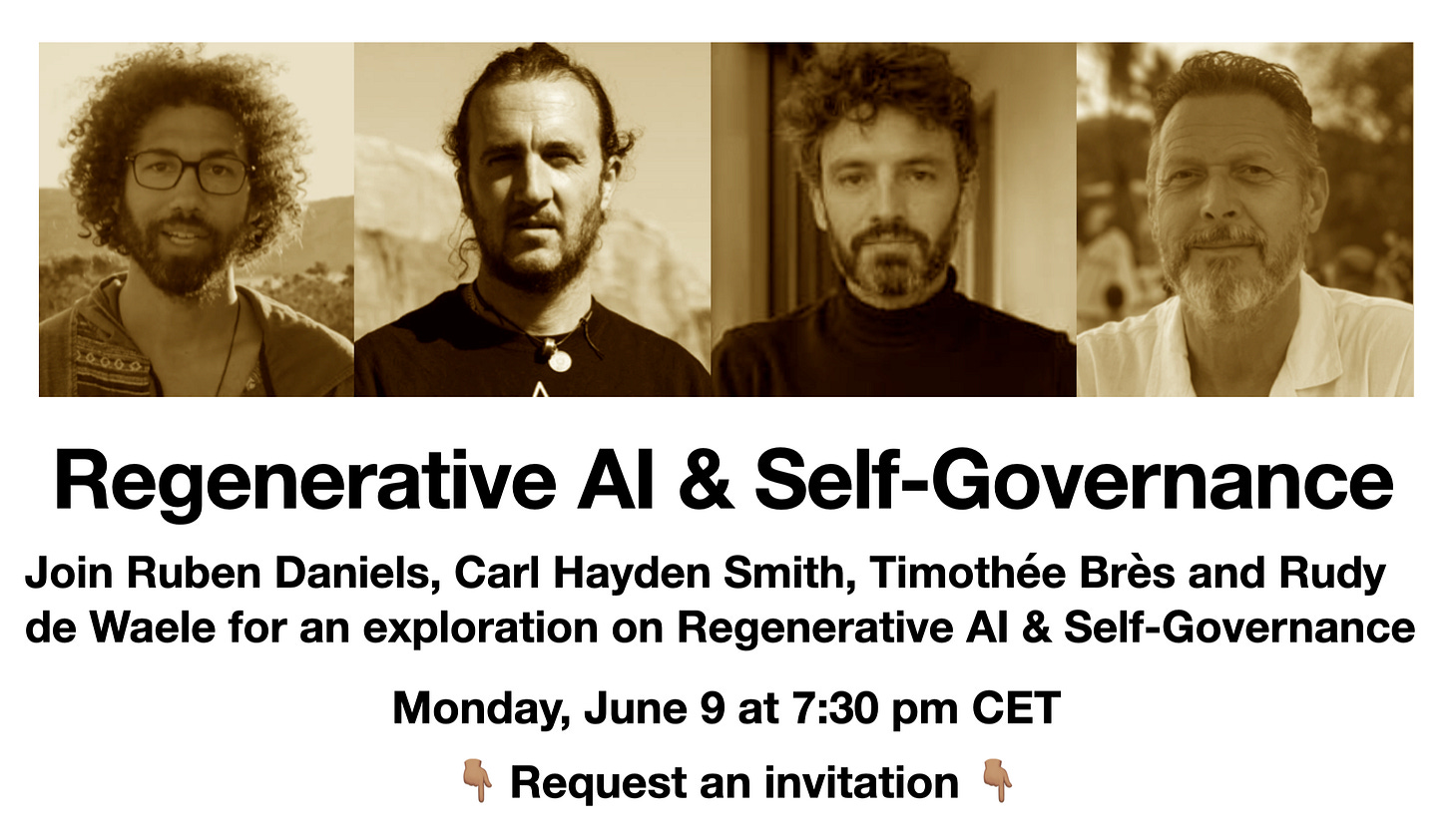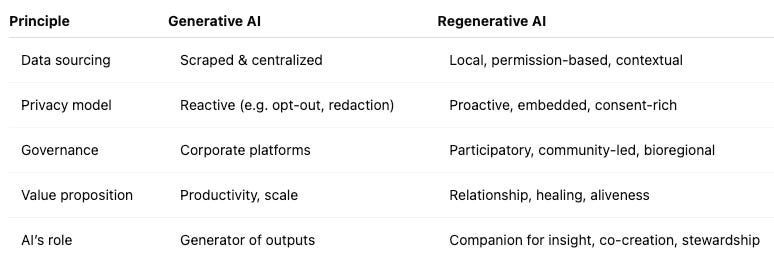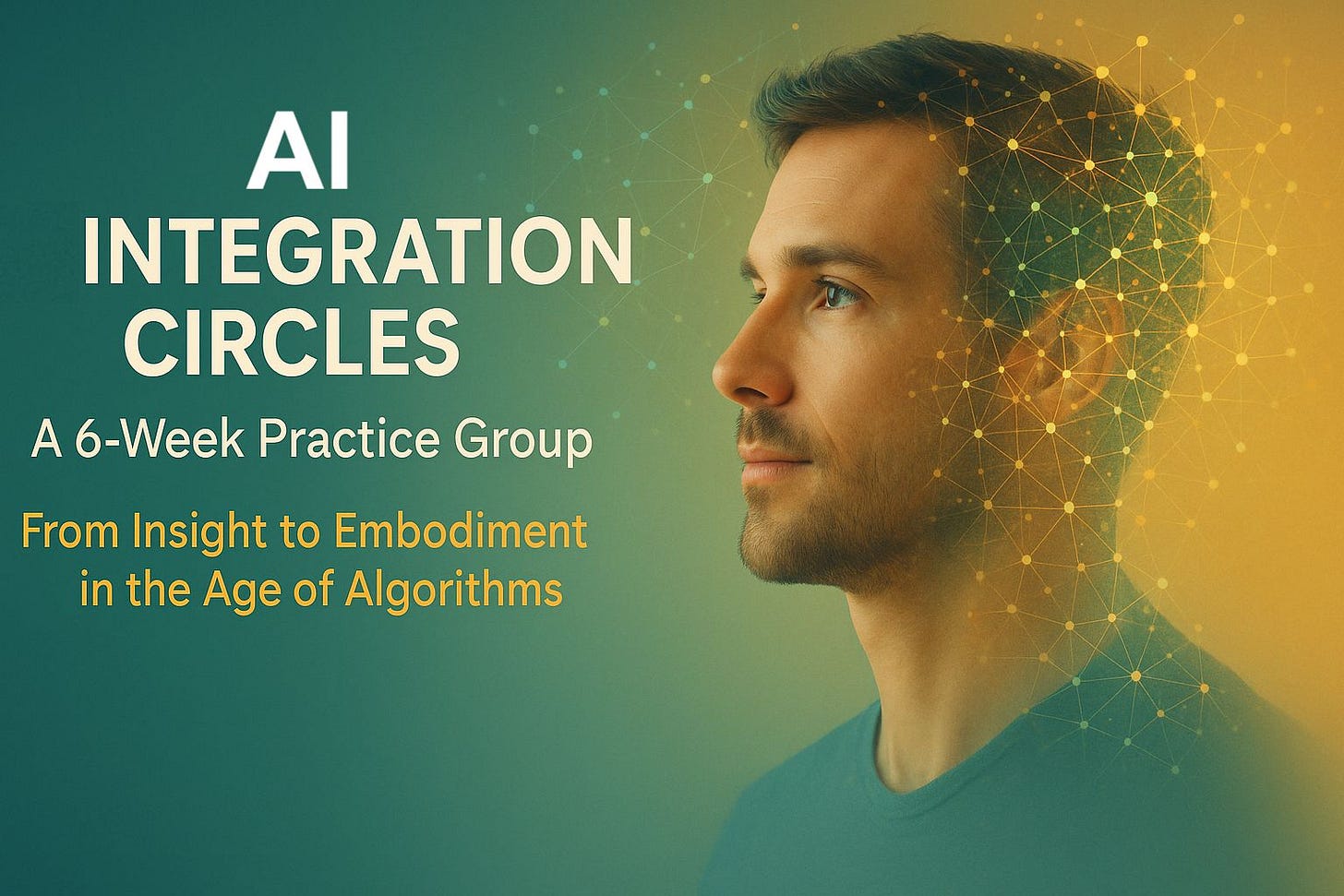From Extraction to Relationship: Rethinking Data, Privacy & AI for a Regenerative Future
Why Europe, Regenerative AI, and Men’s Work Matter for the Future of Humanity
As the world fractures into ideological extremes, old maps no longer help us understand the terrain we're navigating. As Otti Vogt recently wrote, the familiar Cold War binaries - East vs. West, Global North vs. South - are dissolving. In their place, four dominant regimes are battling to define the 21st century: authoritarian statism, authoritarian traditionalism, populist democracy, and standing in contrast to these, the fragile yet vital European Way.
Not just a continent, but a civilisational project—a vision born of catastrophe, and rooted in secular reason, human rights, social solidarity, pluralist law, planetary responsibility. A commitment to institutionalise freedom with care, prosperity with justice, and peace through interdependence.
While the first three, fueled by nationalism, digital control, and patriarchal power, are increasingly converging into a dangerous, tech-enhanced consensus of domination, Europe still stands for something else. Not as a perfect model, but as a fragile and hard-won attempt to balance prosperity with justice, and freedom with care. A place where pluralism, planetary responsibility, and institutional freedom are still, however imperfectly, possible.
But this European Way is eroding: internally, through the rise of illiberal movements; externally, through disinformation, coercion, and cultural warfare; and spiritually, through a loss of faith in its own promise. If it collapses, we may lose the only civilisational framework that has embedded universal ethics into actual institutional form. Not a nostalgic plea, but a sober call: Europe may not be the hero, but it could still be the holding space. A steward, not an empire. A bridge, not a battleground.
This matters deeply, not only politically or economically, but for those of us working with men, leadership, and systems change. Europe’s collective trauma: its wars, guilt, and colonial legacy, mirrors the journey many men now face: confronting shame, finding integrity, reclaiming wholeness. If met with honesty and maturity, this reckoning can seed regeneration.
In the accelerating world of AI, data has become the fuel, and privacy, a battlefield.
But what if the conversation could shift?
From extraction to relationship.
From control to consent.
From industrial intelligence to regenerative wisdom.
“Data is not a resource, it’s a relationship. And privacy is not protection from the world, but a commitment to show up in it with consent and care.”
👇🏽Read below on the design implications of Generative and Regenerative AI👇🏽
Join this live session on Monday, June 9 at 19:30 CET with Ruben Daniels, Carl Hayden Smith, Timothée Brès and Rudy de Waele for a circle exploration on Regenerative AI and Self-Governance.
This session explores how regenerative AI can help us build more ethical, sovereign, and diverse systems. Navigating the unintended consequences of artificial intelligence requires a new approach. In a world shaped by acceleration, disruption, and constant optimisation, we ask a deeper question:
How can technology serve life, not just profit or power?
Ruben is visionary systems thinker working at the intersection of regenerative technology, AI, and digital sovereignty. He supports the design of self-steering organisations, ethical incentive systems, and community-aligned innovations that reconnect humanity to the Earth. Guided by ancient wisdom and a deep sense of service, Ruben empowers those building technologies that foster social connection, ecological balance, and conscious evolution.
Carl Hayden Smith is Associate Professor of Media in the School of Arts & Creative Industries at the University of East London and is the former Head of Research and Director of the Learning Technology Research Centre (LTRC) at the Institute for Creativity & Technology, Ravensbourne University London.
Carl is the founder of the Museum of Consciousness at Oxford University and co-founder of the Cyberdelics Nexus. His research concentrates on the relationship between technology and the human condition and he is developing ‘Hyperhumanism’ which reframes technology as a catalyst for developing our own innate human abilities.
Raising over £10 million in research funding, Carl has worked on numerous large-scale Leonardo LifeLong Learning, Erasmus+, FP7, Horizon 2020 projects and the XPRIZE. He has given over 300 invited public lectures, conference presentations and keynotes in 40 countries and published more than 50 academic papers. His research interests also include Hyperhumanism, Contextology (Context engineering), Embodied Cognition, Spatial Literacy, Umwelt Hacking and Sensory augmentation. His industry partners include Microsoft, Epic Games (Unreal), Unity, Samsung and Hanson Robotics.
Generative AI: Built on Big Data, But at What Cost?
Generative AI models like ChatGPT and Midjourney operate on enormous datasets scraped from the internet, often without consent or acknowledgment. The operating logic is simple: more data equals better models. But the human and ethical costs are high:
Consent is bypassed: Individuals rarely know their data has been used, let alone how.
Privacy risks multiply: Leaks and data exposures become inevitable.
Power concentrates: Data is stored and monetised by a handful of corporate entities.
This is surveillance capitalism rebranded. AI built on commodification, not care.
Regenerative AI: A Paradigm of Relationship
Regenerative AI asks deeper questions:
Whose data is this?
What is the context and meaning embedded in this data?
How can AI serve not just efficiency, but emotional, ecological, and cultural wellbeing?
In this model, data is not a resource, it’s a relationship. Privacy isn’t a checkbox, it’s a boundary of sovereignty. Regenerative AI supports:
Consent-driven design: People opt in and co-create.
Community stewardship: Data is governed at the bioregional or community level.
Contextual integrity: The meaning of data is honoured alongside its utility.
“Design is never neutral. Every line of code is a moral choice about the future we’re building.”
Data Design: A Comparison
Before we dive into the comparison, it's worth pausing to reflect on what these design choices actually mean. Design is not neutral: it encodes values, priorities, and worldviews. The following table contrasts two radically different paradigms: one built for efficiency and scale, the other for stewardship and relationship. The choices we make here will shape not only our technologies but the futures they enable.
Men’s Work, Circles, and the Sacredness of Privacy
Imagine an AI in a therapeutic men's group. In the regenerative model:
It never stores personal reflections without full consent.
It mirrors rather than predicts.
It can summarise group themes only if the group agrees.
It is trained on lived community wisdom, not decontextualised web data.
Here, AI supports healing. It doesn't automate it. It respects the sanctity of the self and the sacredness of relationship.
Final Thought
If generative AI is about scale, regenerative AI is about ethics, intimacy, and aliveness.
Privacy is no longer just a technical concern. It is an invitation to reimagine our relationship with intelligence itself. Let us treat data not as soil to extract, but as living ground (compost) to care for. In that, we plant the seeds of a more just and regenerative future.
Join Timothée Brès and myself for the upcoming 6-week AI Integration Circles Practice Group for men.
AI Integration Circles Practice Group
This is not therapy.
It’s an experiment in relational technology, exploring how AI, when paired with somatic awareness, group dialogue, and emotional anchoring, can help men uncover unconscious patterns and reconnect with their inner truth.
For coaches, technologists, facilitators, healers, and curious men walking the edge of transformation. For those who sense that leadership today demands not just intelligence, but integration.
👉🏼 We begin Monday, June 9 with a live session at 19:30 CET with Ruben Daniels, Carl Hayden Smith, Timothée Brès and Rudy de Waele for a circle exploration on Regenerative AI and Self-Governance, followed by personal and group inquiry. Each session will bring its own emerging surprise and invitation into deeper inquiry and reflection.
🔗 Join us for AI Integration Circles, a 6-Week Practice Group
🗓️ Monday, June 9 – July 14 | Online via Zoom
🕢 7:30pm CET / 6:30pm UK / 1:30pm EST
🌀 Guided by Rudy de Waele & Timothée Brès and special guests.
🎟️ Learn more and register: unconditionalmen.com/ai-integration-circles
This is not a theory lab. It’s an experiential journey, one that blends the modern with the ancient, the digital with the deeply human. Book a call to learn more.
That’s it for this week.
Don’t hesitate to get in touch directly if you have a question about a program or have an idea to collaborate.
Stay true to yourself and take good care of your loved ones.
Sending love, gratitude and appreciation of life,
Rudy
Follow my social media activities on Linktree.
Additional Unconditional Men reading:
Innovation for the Future is Within
People often ask me, “Why do you do this work with men, leadership, and transformation?”
Who Are the Role Models Guiding Your Life—and Who Are You Becoming?
The Masculinity Reckoning—Redefining Strength, Connection, and Leadership
Or check the Unconditional Men newsletter archive.





